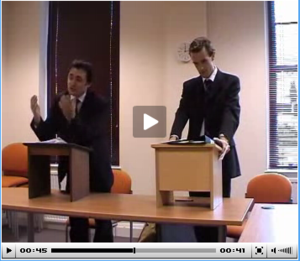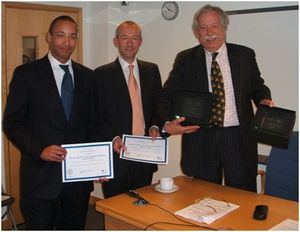Difference between revisions of "Get Mooting: Rundown of Competitions"
From Learnmore
| Line 12: | Line 12: | ||
| − | City also enters | + | City also enters the two big national external mooting competitions: |
| Line 19: | Line 19: | ||
*The [https://global.oup.com/ukhe/mooting/?cc=gb&lang=en OUP and ICCA National Mooting Competition] '' | *The [https://global.oup.com/ukhe/mooting/?cc=gb&lang=en OUP and ICCA National Mooting Competition] '' | ||
*The [https://nationalmooting.org/ ESU-Essex Court National Mooting Competition] | *The [https://nationalmooting.org/ ESU-Essex Court National Mooting Competition] | ||
| − | |||
| − | |||
| − | Teams are chosen on the basis of skeleton arguments on moot problems which are sent around in the first term. Teams of two will generally be selected for each competition. Depending on who you draw, these competitions can involve travel to far off corners of the UK (City will cough up the train fare). The early rounds are generally judged by barristers or academics and the finals are judged by High Court or Crown Court judges. | + | |
| + | Teams are chosen on the basis of skeleton arguments on moot problems which are sent around in the first term. Teams of between two and four will generally be selected for each competition. Depending on who you draw, these competitions can involve travel to far off corners of the UK (City will cough up the train fare). The early rounds are generally judged by barristers or academics and the finals are judged by High Court or Crown Court judges. | ||
Other specialist competitions we may enter include: | Other specialist competitions we may enter include: | ||
| − | |||
| − | |||
| − | |||
| − | |||
| − | |||
| − | |||
===Internal Competitions=== | ===Internal Competitions=== | ||
Revision as of 16:50, 29 September 2021
Whether you want to be a solicitor or barrister, you should get involved in mooting while studying law. There are plenty of opportunities on offer, both at City and through the Inns of Court.
City-specific info

During your first few weeks at City, you will receive information about various mooting competitions. These are a mixture of one-off competitions run by barristers’ chambers organised just for City students, and national competitions which can last throughout the year (depending on how far you go).
Chambers Competitions for City Law School students
Maitland Chambers run a one-off 'advocacy competition' specifically for City GDL students early in the academic year. Entrants must submit a brief skeleton argument on a problem set by Chambers. The four best entrants go through to the final and moot in front of a High Court Judge. Crown Office Chambers hold a competition just for City students across all academic programmes. Places are allocated on a first-come-first-serve basis. There are three rounds which run over three successive weeks.
National Competitions
City also enters the two big national external mooting competitions:
Teams are chosen on the basis of skeleton arguments on moot problems which are sent around in the first term. Teams of between two and four will generally be selected for each competition. Depending on who you draw, these competitions can involve travel to far off corners of the UK (City will cough up the train fare). The early rounds are generally judged by barristers or academics and the finals are judged by High Court or Crown Court judges.
Other specialist competitions we may enter include:
Internal Competitions
Big events within the Law School are the two internal competitions; the GDL Competition and the City Scholars Mooting Competition (for LLB2, LLB3, GELLB and LLM students).
The first round of the GDL Competition will be at the end of term one and the next three rounds (depending on how many students sign up!) will be in term two. The first two rounds will be judged by members of staff and the third by practitioners. The final will be judged by a High Court Judge. Lord Hoffmann (the Hoffmeister) judged the final in 2009 and Lord Mance between 2010 and 2013. Read about the GDL Final 2011-2012 and 2012-13 via Future Lawyer.
The City Scholars Moot has been judged by Lady Hale for the past two years - you can read all about the excitement on our blog for both 2011/12 and 2012/13.
Anyone can enter and so it’s the best way of gaining some public speaking experience, even if you’re knocked out in the first round, though that’s obviously not ideal!
Term Two heralds the final competition of the year at City: the Crown Office Moot. This Moot happens thanks to the generosity of Crown Office Chambers: all rounds are judged by judges from their chambers and they also put up the prize money. See info above in the Chambers Competitions section.
Competitions to enter independently
Inns of Court
Outside of City, the Inns of Court lay on several mooting competitions throughout the year. Check the mooting pages of your Inn to see when their mooting competitions are held and how to enter. You’ll generally be up against BPTC students – it’s always fun to beat people who supposedly have more experience that you. The competitions at the Inns also tend to be on more interesting areas of law than your standard ‘postal rule of acceptance moot. For instance, in 2009 there were moot problems on clinical negligence, public international law and even space law (ie who owns the moon).
Inner Temple organise an Inter-Varsity Moot which is open to all - team selection usually happens around November. Teams of City students have won this competition on many occasions, including 2016-17 (James Gardner & Edward Gilmore) and 2017-18 (Eno Elezi & Henrietta Boyle). Lincoln's Inn hold an inter-provider moot competition for their students via speed-mooting heats, usually around November. Middle Temple hold the Rosamond Smith Mooting Competition annually for its GDL and BPTC members.
Mooting can be hard work. But it’s a lot of fun and is great preparation for interviews later in the year where you’ll often have to do submissions and presentations.
Times 2TG Moot
This moot is organised by The Times and 2 Temple Gardens and is open to all those registered as students. Top prize is £4000, runner-up gets £2000 and all four finalists have a mini pupillage organised with 2TG. Just find yourself a partner!
FTB Kingsland Cup
The Chambers of Francis Taylor Building run this fantastic moot, open to all undergraduates, GDL and BPTC students. Teams of two can enter, with no bar to the number entering from any one institution. First stage is a written one, with teams sending in two skeletons based on the original moot problem: one seeking permission to appeal, the other resisting.
The eight highest-scoring teams will be invited to the semi-final.
City students have a great track record in this competition, winning in 2015/16 and 2016/17.
International Moots
City usually enters one or two international moots a year, these change year on year.
The Monroe E. Price International Media Law Moot Court Competition
The Monroe E. Price International Media Law Moot Court Competitionis organised by the Programme in Comparative Media Law & Policy at the Centre for Socio-Legal Studies, University of Oxford, in collaboration with the International Media Lawyers Association (IMLA). The moot's aim is 'to expand and stimulate an interest in Media Law and Policy among students from law and other disciplines, who will develop expertise in arguing a case before an international bench of judges from different legal systems and backgrounds'.
The European Law Moot Court Competition
Information on the EHRMCC can be a little sketchy, however they will release the problem before requesting written pleadings for both the applicant and defendant from universities all over Europe before a set number of teams go forward to the regional (oral) finals. A City team (Ben Lewy, Miguel Rodriguez, Douglas Grant and Margherita Cornaglia) won this competition in the 2016/17 academic year, read all about it via Future Lawyer.
The European Human Rights Moot
The Willem C. Vis International Commercial Arbitration Moot
Now in its 26th year, the Vis Moot is prestigious and usually attracts participants from over 60 countries. It aims to 'foster the study of international commercial law and arbitration for resolution of international business disputes through its application to a concrete problem of a client and to train law leaders of tomorrow in methods of alternative dispute resolution'.
You can view problems from past years via the Vis website to give some idea of what is involved.
